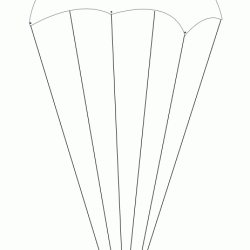Source Institutions
Source Institutions
Add to list Go to activity
Activity link broken? See if it's at the internet archive

In this activity, learners work in groups to design a parachute out of household items that keeps an egg secure when dropped from a certain height. Learners must follow a certain number of design constraints (i.e. parachute's max length can only be 3.28 ft or 1 m). During the test, learners measure the time from the release to the impact, the vertical distance of the fall, and the speed of the egg when it hits the ground. This lesson guide includes background information about Solid Rocket Boosters (SRBs) and questions for learners. This is also a low-cost activity as the lesson guide recommends learners provide the materials.
- 5 to 10 minutes
- 45 to 60 minutes
- free per group of students
- Ages 11 - 18
- Activity, Experiment/Lab Activity, Lesson/Lesson Plan, Model, Simulation
- English
Quick Guide
Materials List (per group of students)
- Egg (provided by learners)
- Household items for parachute (brought in by learners)
- Stopwatch
- Tape measure
- Pencil
- Paper
Subjects
-
Earth and Space Science
-
Astronomy
- Probes, Satellites and Spacecraft
-
Astronomy
-
Engineering and Technology
-
Engineering
- Aerospace Engineering
- Transportation Engineering
-
Engineering
-
Mathematics
- Algebra
-
Data Analysis and Probability
- Data Analysis
- Data Collection
- Data Representation
-
Measurement
- Units of Measurement
- Rate
- Number and Operations
-
The Nature of Technology
-
Technology and Society
- Technology and History
-
The Design Process
- Research and Development
- Invention and Innovation
- Troubleshooting and Maintenance
-
Technology and Society
-
Physical Sciences
-
Motion and Forces
- Gravity
- Momentum and Velocity
- Acceleration
-
Motion and Forces
-
The Nature of Science
- Science and Society
-
The Scientific Process
- Asking Questions
- Conducting Investigations
- Gathering Data
- Formulating Explanations
- Communicating Results
Informal Categories
- Food and Cooking
- Model Building
- Outdoor Activity
- Transportation
Audience
To use this activity, learners need to:
- see
- read
- be mobile
- touch
Learning styles supported:
- Involves teamwork and communication skills
- Involves hands-on or lab activities
Other
Includes alignment to state and/or national standards:
This resource is part of:
Access Rights:
- Free access
By:
- Huegele, Vince ; Hill, Kristy ; Terry, Brenda
Rights:
- Public domain, ,
Funding Source:
- NASA Explorer Institute
